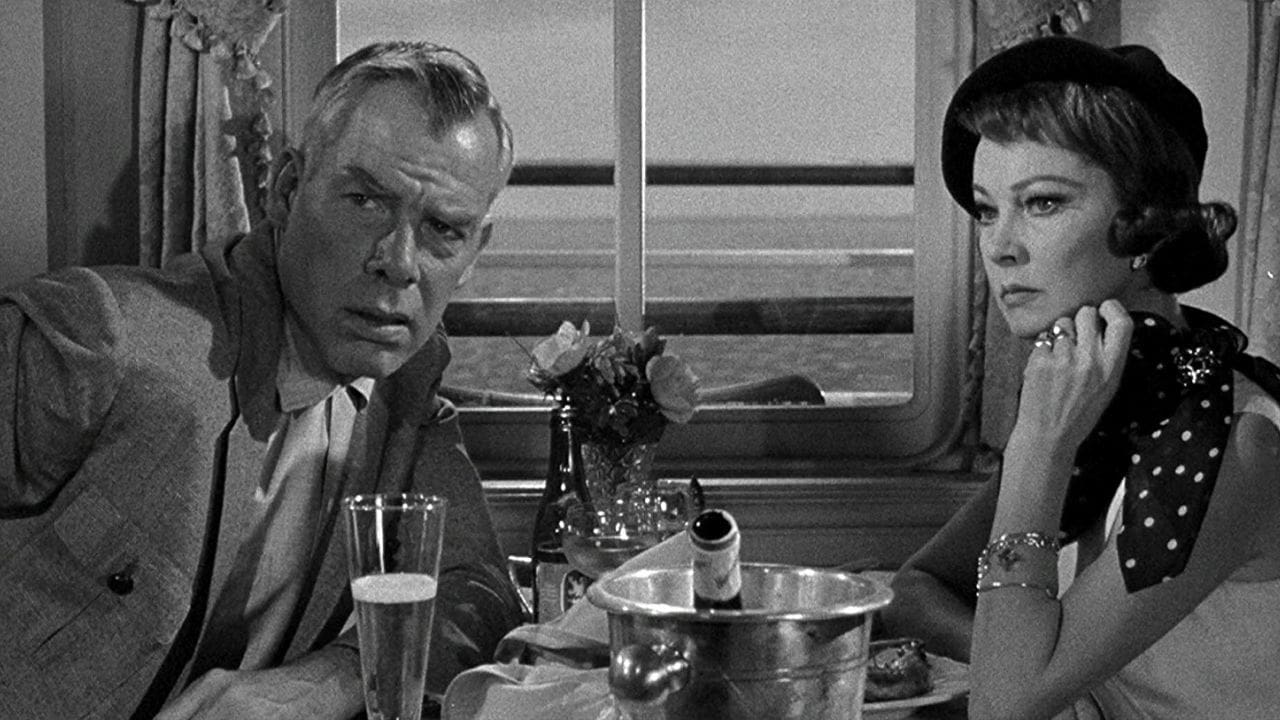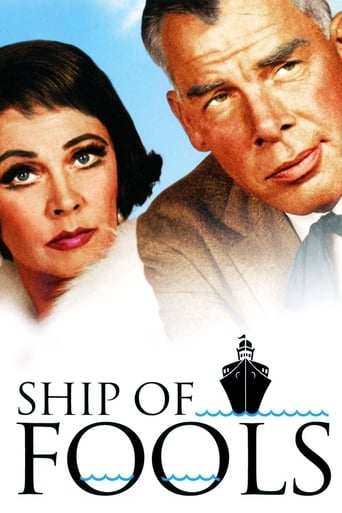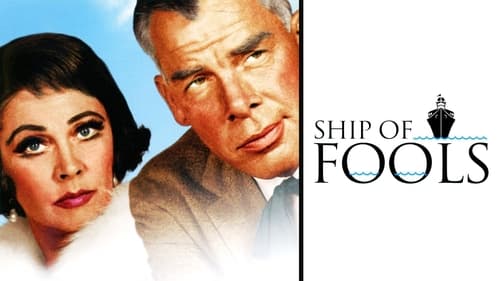



Beautiful, moving film.
This movie was so-so. It had it's moments, but wasn't the greatest.
View MoreIt’s fine. It's literally the definition of a fine movie. You’ve seen it before, you know every beat and outcome before the characters even do. Only question is how much escapism you’re looking for.
View MoreThe story, direction, characters, and writing/dialogue is akin to taking a tranquilizer shot to the neck, but everything else was so well done.
View MoreStanley Kramer was never really known for his subtlety, which is why it's good to say that in the case of Ship of Fools he did cast a few people to try and convey some moments and emotions that weren't as big and decidedly un-subtle as in Judgment at Nuremburg or Guess Who's Coming to Dinner. I'm not saying that being brash and overly dramatic with the story's message is necessarily a bad thing in and of itself, and with Nuremburg it worked (in Dinner it just didn't for me). But with Ship of Fools what works is that it's like changing the channels between about seven or eight channels with each one having different characters in the same time period, so if one channel starts to drag a little it can flip to another and it might be more interesting or compelling.The film doesn't have a strong story, which is both to its benefit and detriment. If there was something that was at the core that this was all working or building towards (I'm not saying it needed an iceberg or some contrivance, just some goal or spine), then you could follow these characters with this or that. But it's all about just the context of the people on the boat and the time period: 1933 on a ship going from Mexico to Europe, transporting Spaniards who were working in Mexico and now returning home, and mostly Germans and some Americans (i.e. Lee Marvin) and there is the whole 'upstairs downstairs' aspect. The white people, mostly, get the better level while the Spanish don't, but they end up mingling together for various reasons, such as there's a dancing scene at dinner one night that really is mind-blowing and the most entertaining part of the film, and there's a woman who becomes kind of a prostitute on the ship.There's a wide array of Characters with a capital C, and some of them really *mean* things while others maybe not so much. Vivien Leigh is the (just slightly) older woman who was once probably to die for and now time has sort of passed her by from her jazz days; the Southern boozer (Marvin) who doesn't get why Jews are put down by the Germans but can't help but drop n****er a few times without even seeming to notice; Oskar Werner is a doctor who becomes a sort of friend to Simone Signoret (I say sort of since it unfolds into what may be a romance for him, and for her is more mysterious); and George Segal is an artist who can't seem to really make a living at that job since he works for money elsewhere, and Elizabeth Ashley as his flustered would-be lover.I may have neglected to mention some of the German characters, of which there are many, including a dwarf, one of the more interesting people in the movie who sort of opens the film with a 4th-wall breaking moment (not really to repeat itself, and I wish either Kramer had more of it or dropped it altogether as it's unnecessary). The main message is pretty clear: when you throw together this group of people, especially when it's Germans in 1933 right as Hitler is going to take power in the election and it's the sort of thing that, as one character says, "Hey, I'm not anti-semetic" (as if saying "I'm not racist, which usually means someone is) and in the midst of these fellow Germans and others adrift in life or, of course, the Spaniards, you get some mixed emotions and high tension and passions.But I think that because of the lack of some core story or something to work towards it's just a character portrait. That would be fine, to be sure, and at times watching this I wondered what Robert Altman would've made of the novel (probably a lot more, I'd wager). Some scenes really do stand out, such as the man who cries out against some of the Germans due to his wife being Jewish (though the scene that really works with him is a little later, when he admits to the one apologetic older German lady that he and his wife separated), and of course people like Werner and Signoret are perfect together. Marvin I liked a lot as well, though it's more his screen presence to bring something else to the character. Leigh and Segall are fine, but also with characters that, again, have a lot of screen time but not too much depth otherwise.The film is photographed beautifully (it won an Oscar subsequently), and many moments of dialog are enjoyable and fun and sincere enough to not be taken melodramatically, but it's a thing of the 'parts more than the whole'. In other words, it's like the more serious, slightly shorter and less ambitious (in terms of cinematic scope) version of Kramer's own It's a Mad Mad Mad Mad World. Worth watching, especially if you like the actors, but not essential.
View MoreVery well chosen cast with great quality on the actors and actresses performances. Flick with some important ideas like the struggle against the prejudice between people (Nazi stuff included). Other relevant social aspects are raised. Characters with very close to real mindsets that capture almost any real personality. Glocken is a key-character not just for the narrator parts but also for his understanding of life in general (and the interaction between almost all the important characters). The dog in this picture is priceless^^ (he is almost a character^^) This movie also contains very interesting love stories and a great ending. I don't give an extra star just for the lack of German language during the entire film (i think it wouldn't be a commercial success if it had German as the main language but that's just my opinion because the universe where this is happening begs for German).
View MoreThere is a ship full of passengers in the film, but it is not Titanic, there's no icebergs either, with a satirical overtone, this Oscar-winning (BEST ART DIRECTION and CINEMATOGRAPHY in B&W section) film from Hollywood's ill-fated tycoon Stanley Kramer, who has nominated for 9 Oscars without a single win, could be best interpreted as a bourgeois lampoon to the times before WWII (1930s). The hotchpotch of the first-class passengers (from Mexico to Europe) depicted in the film are complying with the milieu of that particular period, notably the 3 Oscar-nominated performance from Simone Signoret, Oskar Werner and Michael Dunn (the latter is a very interesting example of a nomination from a normally pedestrian presence, I hope the dwarf card is not the case here), and judging by my taste, Heinz Rühmann and Vivien Leigh are also quite in the top form, especially Ms. Leigh, not to mention her turbulent real life status at that time, her frail with dignity performance is rather too harrowing to watch. However the true heartrending sympathy I am able to sense is from a divine Simone Signoret, a countess on exile, along with her foredooming love story with the inward doctor on board Oskar Werner. One thing niggling me is the film's aloof stance towards the poor underclass, they are living in another parallel world even though they are on the exactly same boat with those well-off patrons in the first class. I expected that the film could have gone much further by creating the contradictions between these two classes and which would be more emotionally radical to underline the more meaningful exposition on human's prejudices. But the film doesn't offer this on its tilted menu and most characters are indulging themselves in their own insignificant trifles which I easily lost my absorption to address myself to.
View MoreStanley Kramer's adaptation of Katherine Porter's novel is epic is scope, but not at the expense of character development. In fact, this is Kramer's least bloated film. Viewing a pre-WWII world in microcosm on board a liner traveling from Mexico to Bremerhaven, SHIP OF FOOLS is at various times bleak and lighthearted, but always compelling. Kramer and scriptwriter Abby Mann take Porter's hefty tome and pare it down to an ironic bare-bones masterpiece. Oskar Werner and Simone Signoret head the cast as the ship's less than enthused doctor and a down on her luck contessa. They're both excellent, with Werner epitomizes the disengaged German seemingly unconcerned about the growing tide of horror in his homeland. Signoret has never been as touching or earthy. They're ably supported by a terrific cast: George Segal and Elizabeth Ashley as hot-headed American artists, Lee Marvin as a blustery pro ballplayer, Jose Ferrer as Werner's Jew-hating doppelganger. Vivian Leigh is the ship's lost soul and Michael Dunn is a the Greek chorus, commenting wryly on the boatload of fools. Featuring great art direction, excellent B&W cinematography by Ernest Laszlo and some of Kramer's finest direction. Lilia Skala and Jose Greco are in it too.
View More